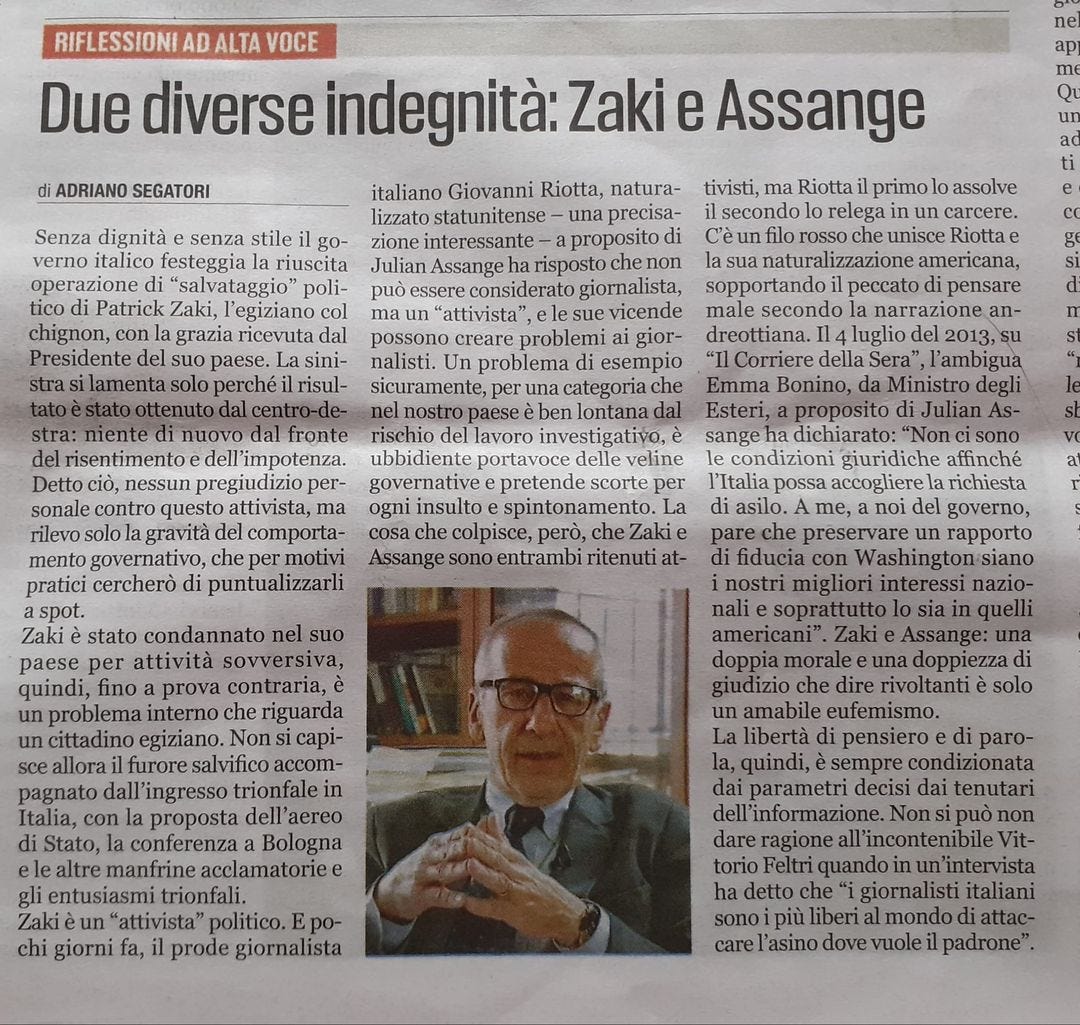👁🗨 Zaki & Assange, des indignations bien contrastées.
Deux poids, deux mesures & une duplicité de jugement que l'on peut qualifier de révoltante : “Les journalistes italiens sont les plus libres du monde d'attaquer l'âne là où le maître le permet”.
👁🗨 Zaki & Assange, des indignations bien contrastées.
Par Adriano Segatori, le 5 août 2023 - English version below
Sans dignité ni style, le gouvernement italien célèbre le "sauvetage" politique réussi de Patrick Zaki, l'Égyptien au chignon, en lui accordant la grâce présidentielle. La gauche se plaint uniquement que le résultat a été obtenu par le centre-droit : rien de nouveau sur le front du ressentiment et de l'incompétence.
Cela dit, je n'ai aucun préjugé personnel à l'égard de ce militant, mais je ne fais que constater la gravité du comportement de ce gouvernement, que je vais essayer de mettre en lumière.
Zaki a été condamné dans son propre pays pour activité subversive, donc jusqu'à preuve du contraire, il s'agit d'une affaire interne concernant un citoyen égyptien. Il est donc difficile de comprendre la fureur salvatrice qui a accompagné son arrivée triomphale en Italie, avec mise à disposition d'un avion gouvernemental, conférence à Bologne et autres acclamations et enthousiasmes triomphalistes.
Zaki est un "activiste" politique. Et il y a quelques jours, le célèbre journaliste italien Giovanni Riotta, naturalisé américain - précision intéressante - a répondu à une question posée à propos de Julian Assange qu'il ne pouvait pas être considéré comme un journaliste, mais bien comme un "activiste", et que ses agissements pouvaient être source de problèmes pour les journalistes. Un problème, certes, pour une catégorie qui, dans notre pays, est très peu concernée par les risques du travail d'investigation, qui se fait le porte-parole servile des velléités gouvernementales et exige des escortes à la moindre insulte et/ou bousculade. Pourtant, il est intéressant de noter que Zaki et Assange sont tous deux considérés comme des activistes, mais qu’alors que Riotta acquitte le premier, le second est relégué dans la case prison. Un fil rouge relie Riotta à sa naturalisation américaine, porteuse du péché de la mal pensée selon le récit andréottien [Giulio Andreotti est un journaliste, écrivain et homme d'État italien. dirigeant de la Démocratie chrétienne] . Le 4 juillet 2013, dans "Il Corriere della Sera", l'ambiguë Emma Bonino, alors ministre des Affaires étrangères, déclarait à propos de Julian Assange :
“Aucune disposition légale ne permet à l'Italie d'accepter sa demande d'asile. Il me semble, à nous qui sommes au gouvernement, que préserver une relation de confiance avec Washington est dans notre meilleur intérêt national, et surtout de celui de l'Amérique”.
Zaki et Assange : deux poids, deux mesures et une duplicité de jugement que l'on peut qualifier de révoltante, ce qui est un doux euphémisme.
La liberté de pensée et d'expression est donc toujours conditionnée par les paramètres définis par les gardiens de l'information. On ne peut qu'être d'accord avec l’immense Vittorio Feltri [journaliste, écrivain et homme politique italien]qui déclarait dans une interview que
“les journalistes italiens sont les plus libres du monde d'attaquer l'âne là où le maître le permet”.
👁🗨 Zaki & Assange, contrasted indignation.
By Adriano Segatori, August 5, 2023
Without any dignity or style, the Italian government celebrates the successful political "rescue" of Patrick Zaki, the Egyptian with the bun, by granting him a presidential pardon. The left complains only that the result was achieved by the center-right: nothing new on the front of resentment and incompetence.
Having said that, I have no personal prejudice against this activist, but I am merely noting the seriousness of this government's behavior, which I will try to highlight.
Zaki was convicted in his own country for subversive activity, so until proven otherwise, this is an internal matter concerning an Egyptian citizen. So it's hard to understand the saving fury that accompanied his triumphant arrival in Italy, complete with government plane, conference in Bologna and other triumphalist cheers and enthusiasm.
Zaki is a political "activist". And a few days ago, the famous Italian journalist Giovanni Riotta, a naturalized American - an interesting clarification - replied to a question about Julian Assange that he could not be considered a journalist, but an "activist", and that his actions could be a source of problems for journalists. A problem, certainly, for a category which, in our country, is hardly concerned by the risks of investigative work, and which becomes the slavish mouthpiece of governmental desires, demanding escorts at the slightest insult and/or jostle. Yet it's interesting to note that both Zaki and Assange are considered activists, but while Riotta acquits the former, the latter is relegated to prison. A red thread links Riotta to his American naturalization, the bearer of the sin of evil thinking according to the Andreotti narrative [Giulio Andreotti is an Italian journalist, writer and statesman. leader of the Christian Democracy] . On July 4, 2013, in "Il Corriere della Sera", the ambiguous Emma Bonino, then Minister of Foreign Affairs, said of Julian Assange:
"There is no legal provision for Italy to accept his request for asylum. It seems to me, those of us in government, that preserving a relationship of trust with Washington is in our best national interest, and above all in America's".
Zaki and Assange: double standards and a duplicity of judgment that can only be described as revolting, which is putting it mildly.
Freedom of thought and expression is always conditioned by the parameters defined by the guardians of information. We can only agree with the immense Vittorio Feltri [Italian journalist, writer and politician] who declared in an interview that
"Italian journalists are the freest in the world to attack the donkey where the master allows".






